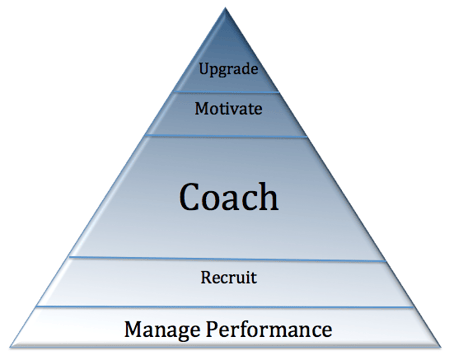.jpg?width=2200&name=analysis-blackboard-board-355952%20(1).jpg)
While driving into work earlier this year, I heard an incredibly powerful performance question while listening to the Dan LeBetard with Stugatz ESPN radio show. An ardent Michigan State Football beat writer asked this question during the Big 10 media day.
“You came to Ann Arbor with perhaps the most hype of any coach in the history of the Big Ten. Maybe in all of college football. A few years later you’ve got a third place, a third place and fourth place finish. And you’re 1-5 against Michigan State and Ohio State. What do you have to do this year to demonstrate to the Michigan community that you are on the path to achieving what they hired you to achieve?”
I immediately thought about all the sales managers we’ve worked with over the last 25 years and the challenges they faced getting their salespeople to perform as expected. Let me explain for just a minute:
- New hires are not hired hoping/expecting that they will be average
- Hiring managers search for, find, interview, screen, and contract new producers thinking/expecting them to be great
- According to Geoff Smart in his book Topgrading – 75% of new hires are no better and often perform worse then the people the replaced.
In most companies we find that the bottom 40% of producers are responsible for less than 20% of the total sales production (in many cases less than 10% of new business- even when we take out new hires with less than 2 years of service). So the question must be asked– did you hire them this way or make them this way?
So let’s look again at this reporter's brilliant question:
Reporter's Question: “You came to Ann Arbor with perhaps the most hype of any coach in the history of the Big Ten. Maybe in all of college football. A few years later you’ve got a third place, a third place and fourth place finish. And you’re 1-5 against Michigan State and Ohio State. What do you have to do this year to demonstrate to the Michigan community that you are on the path to achieving what they hired you to achieve?”
Your Question: “You came into ABC company with high expectations and a strong track record of success that we thought you would continue here. Here we are two years later and in our stack ranking for new business you have finished 9th and 10th. And your pipeline is consistently 66% of what it is supposed to be and your average size sales is $10,000 instead of the anticipated $15,000. What do you have to do over the next 120 days to demonstrate to yourself and to the company that you are on the path to achieving what we hired you to achieve?”
This is the question you should be asking your non-performing people NOW!
This question should have been asked of an under performer within 6 months of the end of the expected ramp-up period. In other words, if your ramp-up period is 18 months and Jamie is at 12 months and not projecting to meet and exceed expected performance, this conversation needs to take place.
Be brave, ask the tough questions about performance, improve your coaching and get better results.
If you liked this article, please share it with friends, family and colleagues below!


